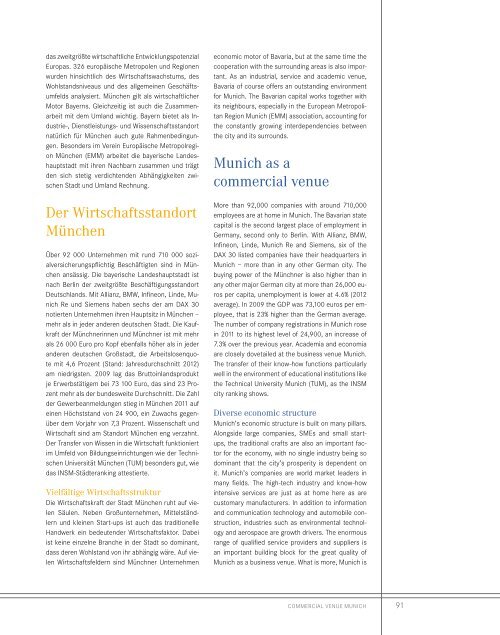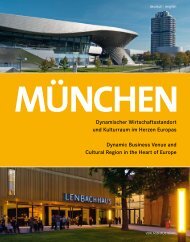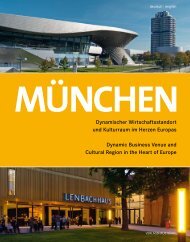Buch_Muenchen
Create successful ePaper yourself
Turn your PDF publications into a flip-book with our unique Google optimized e-Paper software.
das zweitgrößte wirtschaftliche Entwicklungspotenzial<br />
Europas. 326 europäische Metropolen und Regionen<br />
wurden hinsichtlich des Wirtschaftswachstums, des<br />
Wohlstandsniveaus und des allgemeinen Geschäftsumfelds<br />
analysiert. München gilt als wirtschaftlicher<br />
Motor Bayerns. Gleichzeitig ist auch die Zusammenarbeit<br />
mit dem Umland wichtig. Bayern bietet als Industrie-,<br />
Dienstleistungs- und Wissenschaftsstandort<br />
natürlich für München auch gute Rahmenbedingungen.<br />
Besonders im Verein Europäische Metropolregion<br />
München (EMM) arbeitet die bayerische Landeshauptstadt<br />
mit ihren Nachbarn zusammen und trägt<br />
den sich stetig verdichtenden Abhängigkeiten zwischen<br />
Stadt und Umland Rechnung.<br />
Der Wirtschaftsstandort<br />
München<br />
Über 92 000 Unternehmen mit rund 710 000 sozialversicherungspflichtig<br />
Beschäftigten sind in München<br />
ansässig. Die bayerische Landeshauptstadt ist<br />
nach Berlin der zweitgrößte Beschäftigungsstandort<br />
Deutschlands. Mit Allianz, BMW, Infineon, Linde, Munich<br />
Re und Siemens haben sechs der am DAX 30<br />
notierten Unternehmen ihren Hauptsitz in München –<br />
mehr als in jeder anderen deutschen Stadt. Die Kaufkraft<br />
der Münchnerinnen und Münchner ist mit mehr<br />
als 26 000 Euro pro Kopf ebenfalls höher als in jeder<br />
anderen deutschen Großstadt, die Arbeitslosenquote<br />
mit 4,6 Prozent (Stand: Jahresdurchschnitt 2012)<br />
am niedrigsten. 2009 lag das Bruttoinlandsprodukt<br />
je Erwerbstätigem bei 73 100 Euro, das sind 23 Prozent<br />
mehr als der bundesweite Durchschnitt. Die Zahl<br />
der Gewerbeanmeldungen stieg in München 2011 auf<br />
einen Höchststand von 24 900, ein Zuwachs gegenüber<br />
dem Vorjahr von 7,3 Prozent. Wissenschaft und<br />
Wirtschaft sind am Standort München eng verzahnt.<br />
Der Transfer von Wissen in die Wirtschaft funktioniert<br />
im Umfeld von Bildungseinrichtungen wie der Technischen<br />
Universität München (TUM) besonders gut, wie<br />
das INSM-Städteranking attestierte.<br />
Vielfältige Wirtschaftsstruktur<br />
Die Wirtschaftskraft der Stadt München ruht auf vielen<br />
Säulen. Neben Großunternehmen, Mittelständlern<br />
und kleinen Start-ups ist auch das traditionelle<br />
Handwerk ein bedeutender Wirtschaftsfaktor. Dabei<br />
ist keine einzelne Branche in der Stadt so dominant,<br />
dass deren Wohlstand von ihr abhängig wäre. Auf vielen<br />
Wirtschaftsfeldern sind Münchner Unternehmen<br />
economic motor of Bavaria, but at the same time the<br />
cooperation with the surrounding areas is also important.<br />
As an industrial, service and academic venue,<br />
Bavaria of course offers an outstanding environment<br />
for Munich. The Bavarian capital works together with<br />
its neighbours, especially in the European Metropolitan<br />
Region Munich (EMM) association, accounting for<br />
the constantly growing interdependencies between<br />
the city and its surrounds.<br />
Munich as a<br />
commercial venue<br />
More than 92,000 companies with around 710,000<br />
employees are at home in Munich. The Bavarian state<br />
capital is the second largest place of employment in<br />
Germany, second only to Berlin. With Allianz, BMW,<br />
Infineon, Linde, Munich Re and Siemens, six of the<br />
DAX 30 listed companies have their headquarters in<br />
Munich – more than in any other German city. The<br />
buying power of the Münchner is also higher than in<br />
any other major German city at more than 26,000 euros<br />
per capita, unemployment is lower at 4.6% (2012<br />
average). In 2009 the GDP was 73,100 euros per employee,<br />
that is 23% higher than the German average.<br />
The number of company registrations in Munich rose<br />
in 2011 to its highest level of 24,900, an increase of<br />
7.3% over the previous year. Academia and economia<br />
are closely dovetailed at the business venue Munich.<br />
The transfer of their know-how functions particularly<br />
well in the environment of educational institutions like<br />
the Technical University Munich (TUM), as the INSM<br />
city ranking shows.<br />
Diverse economic structure<br />
Munich’s economic structure is built on many pillars.<br />
Alongside large companies, SMEs and small startups,<br />
the traditional crafts are also an important factor<br />
for the economy, with no single industry being so<br />
dominant that the city’s prosperity is dependent on<br />
it. Munich’s companies are world market leaders in<br />
many fields. The high-tech industry and know-how<br />
intensive services are just as at home here as are<br />
customary manufacturers. In addition to information<br />
and communication technology and automobile construction,<br />
industries such as environmental technology<br />
and aerospace are growth drivers. The enormous<br />
range of qualified service providers and suppliers is<br />
an important building block for the great quality of<br />
Munich as a business venue. What is more, Munich is<br />
Commercial Venue Munich 91




